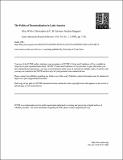| dc.description.abstract |
One of the most significant developments in Latin American politics and political economy in the last two decades has been the increasing decentralization of government. This development has generated a substantial literature on the pros and cons of decentralization and on subnational politics but few attempts to explain differences in the pattern of decentralization across countries. Fiscal decentralization must be understood as a political bargain involving presidents, legislators, and subnational politicians, each having somewhat conflicting preferences. How these bargains are struck will depend heavily on the lines of accountability within political parties. In systems with centralized political parties, the central government has exercised greater control over resources and uses than in countries with decentralized parties, in which subnational politicians exercise strong influence over legislators. The articles explores this hypothesis through a comparative analysis of decentralization in Brazil, Argentina, Colombia, Venezuela and Mexico. |

